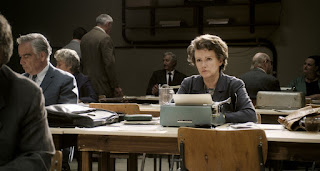The Banality of Evil: A Reflection on the Film Hannah Arendt (2012) and the Book Eichmann in Jerusalem (1963)
THE BANALITY OF EVIL: A REFLECTION ON THE FILM HANNAH AREDNT (2012) AND THE BOOK EICHMANN IN JERUSALEM (1963)
 Michael DeNobile reviews the 2012 film Hannah Arendt and Arendt's 1963 moral political thesis Eichmann in Jerusalem and their moral implications.
Michael DeNobile reviews the 2012 film Hannah Arendt and Arendt's 1963 moral political thesis Eichmann in Jerusalem and their moral implications.I am, of course, as you know, a Jew. And I’ve been attacked for being a self-hating Jew who defends Nazis and scorns her own people. This is not an argument. That is a character assassination. I wrote no defense of Eichmann. But I did try to reconcile the shocking mediocrity of the man with his staggering deeds. Trying to understand is not the same as forgiveness. I see it as my responsibility to understand. It is the responsibility of anyone who dares to put pen to paper on the subject. Since Socrates and Plato, we usually call thinking to be engaged in that silent dialogue between me and myself. In refusing to be a person, Eichmann utterly surrendered that single most defining human quality, that of being able to think. And consequently, he was no longer capable of making moral judgments. This inability to think created the possibility for many ordinary men to commit evil deeds on a gigantic scale, the like of which one have never seen before. . . . I hope that thinking gives people the strength to prevent catastrophes in these rare moments when the chips are down. ~Hannah Arendt
The problem with history is that it is personal, sometimes too personal. Hannah Arendt knew this all too well as she herself lived through it, and yet she thought that honesty had a place in the reporting of history. In her pursuit of truth and understanding, and reporting of the facts, she found herself in a whirlwind of controversy not due to what she wrote but of what others reported that she wrote. She was accused of sympathizing and defending Eichmann in her writing, and yet if one were to actually read Eichmann in Jerusalem, there is no such defense. Arendt’s work is a case study in understanding evil and a cold report of the facts of the trial of the head of the Gestapo Department 4-B4 for Jewish Affairs, who oversaw the deportation of millions of Jews to concentration camps and ultimately extermination in what became known as “the Final Solution to the Jewish Question,” better known as the Holocaust.
Accusations of her defense of Eichmann boiled down to two points: she refused to define Eichmann as a demonically evil monster but a thoughtless, “normal” nobody bureaucrat, and reported the fact from the trial that there were Jewish leaders who worked with Eichmann’s office in assisting in the deportation of Jews to concentration camps, suggesting that the totality of the lives lost might not have been between four and a half to six million if these leaders did not cooperate. Her argument was twisted to be a blaming of the victim, when in her own words her point was simple: the moral corruption of the Nazis went far beyond their own, contaminating nearly every corner of the continent of Europe, and manipulating the moral fabric of not only the persecutors but also the victims. The fact that Jewish leaders cooperated with the Nazis was a further indictment of the Nazis themselves, not the Jewish leaders, for Arendt understood that resistance was impossible in the environment created by the Nazis.
No where in Arendt’s pages does one get a sense that she felt Eichmann was innocent of his crimes, nor that his execution was unjustified, but that the case study of Nazi Germany is a case study in understanding the true nature of evil, especially the extreme and banal quality of it as demonstrated in World War II. Reading her work provides interesting insight to works of literature as William Golding’s Lord of the Flies, who too was fascinated with the banality of evil committed by ordinary human beings and how those individuals can corrupt the moral integrity of even the most innocent of people.
It is unfortunate that individuals like Hannah Arendt are condemned in their time without a full understanding of their intent and meaning. Honesty belongs in the report of history. History is personal; it is also complicated and difficult to tell. In Eichmann in Jerusalem, Arendt not only dared to put pen to paper, but she fulfilled her responsibility to understand. It is in understanding that we can contextualize true history.
For inquiries with Michael DeNobile, you can email him at michael.denobile@gmail.com.

Comments
Post a Comment